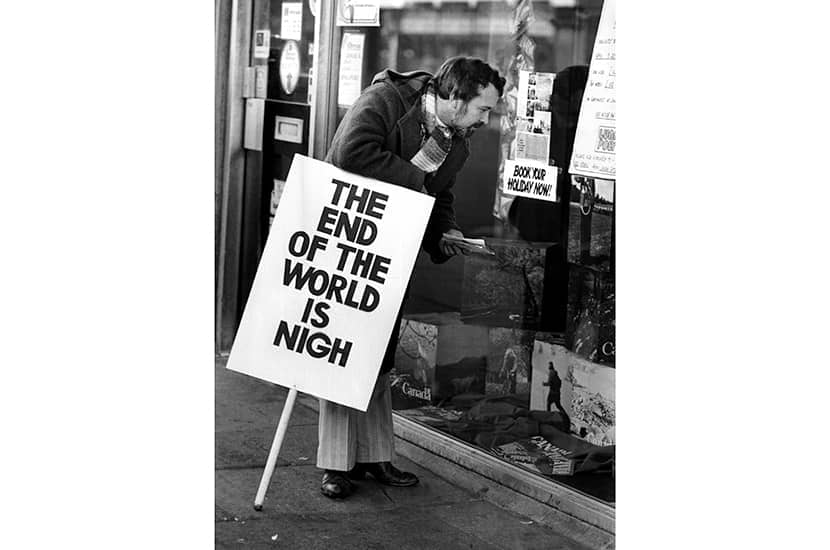Typically for my generation, I woke repeatedly as a kid with my pyjamas soaked in sweat because I’d had yet another nightmare about nuclear war. While I rarely dream about mushroom clouds any more, a dark cloud of one shape or another has dogged me like a sooty, vaporous stray for my entire life.
For my conservative classmates in the mid-1960s, American democracy was on the cusp of being overtaken by communism, even if they weren’t sure what that bogeyman was. Yet don’t imagine liberals like my parents were by contrast keeping sensibly calm and carrying on. The left has manfully merchandised the end of the world since I can remember.
In 1968, Paul Ehrlich’s The Population Bomb exploded as an international bestseller, promoting a doomsday paradigm to which I proved especially susceptible. At 16, I spent a whole semester of independent study writing and researching an essay on ‘Motivational aspects of population growth’, kicking off what would become a lifelong preoccupation with demography. My middle-class parents had remorselessly shoved down my throat how guilty I should feel over my good fortune (‘privilege’ not yet enjoying a vogue) in a world suffering untold privation. As pushback, I may have instinctively responded to a viewpoint that framed the plight of the poor as all their fault. Horror of entomological swarms of humanity also nourished my incipient misanthropy, which by 2022 has grown so broadly entrenched in left-wing catechism that it no longer makes me feel special.
We might as well be members of a millenarian cult who stay up all night in a field awaiting the rapture
Before today’s inescapable mass extinction from heart disease because we’re all too fat, we were all going to starve. Remember William and Paul Paddock’s Famine 1975! America’s Decision: Who Will Survive? The nutritional needs of our burgeoning species were exceeding ‘the carrying capacity of the land’. Norman Borlaug’s Green Revolution put an end to that party, but never fear, plenty of looming catastrophe was lined up to take starvation from overpopulation’s place.
It’s easy to forget that in 1975 Newsweek ran a cover story, ‘The Cooling World’, which explained that evidence for an upcoming ice age was accumulating ‘so massively that meteorologists are hard-pressed to keep up with it’. Along with a host of eminent scientists, the magazine’s science editor Peter Gwynne predicted shortened growing seasons, famine (naturally) and frozen shipping lanes starting as early as the 1980s. It’s also easy to forget that before our big terrible problem was burning too much oil, we were menaced with the impending prospect of running out of it.
Astonishingly, I have so far survived comfortably intact innumerable environmental cataclysms that were about to end life as we knew it. Acid rain and desertification would destroy plant life. Drained aquifers and topsoil erosion would make industrial agriculture impossible. Even decades ago, denuding rain forests was going to wreak havoc with the Earth’s delicate ecology, and plummeting biodiversity would soon inhibit the development of new life-saving drugs. Wars over finite, ravaged resources were inevitable. Air and water pollution would make cities unliveable and give everyone cancer, while holes in the ozone layer would turn sunbathers radioactive. Fast-forward? Antibiotic-resistant bacteria will shortly make even minor surgery lethal, and farming will cease because there aren’t any bees. Rarely are we ever informed that a designated existential crisis has been conclusively sorted, much less that an earlier admonition that we’re all gonna die was overblown.
Like many news voyeurs, I adopt pet calamities, which require regular feeding, just like the pets that bark. I’m particularly attached to worldwide fresh-water shortage, invasions of alien plant and animal species (a metaphor for mass migration?), plastic contamination of the oceans and global economic collapse; loyal to my 16-year-old self, I still obsess over population. The tell-tale sign of having taken a disaster into your home and fallen in love with its soulful gaze of imminent Armageddon? Reports that it’s getting worse make you, in a perverse, roundabout way, sort of happy.
Don’t get me wrong. Some of these threats have been (and remain) real, and acting on justifiable anxiety reaps rewards. Bans on hydrofluorocarbons helped close holes in the ozone layer. Thanks to stricter regulations, most urban skies in the West no longer look like airborne diarrhoea, and once-fetid waterways can sustain the odd trout. If anything, nowadays we devote too little anxiety to nuclear war, not that anguishing improves the odds.
Still, we seem to have developed an unhealthy emotional dependency on doom for a sense of purpose, and I’m starting to feel a bit suckered by this eternal eschatological bait-and-switch. We might as well be members of a millenarian cult who stay up all night in a field awaiting the rapture. Once judgment day fails to arrive, we pick the grass from our hair and go to find some breakfast. Our Prophet sets a later date for the great reckoning. We return to the field. Repeat. We return to the field.
This week, I was struck by an observation in Edward Paice’s new analysis of African demography, Youthquake. Dire depictions of runaway global population growth in the 1970s — which also had young people foreswearing children — entailed ‘strikingly similar rhetoric to the climate crisis today… The Zero Population Growth movement has been replaced by the pursuit of net-zero emissions, and catastrophism is as irresistible to western news media as it was 50 years ago’. (Lesson: never trust any movement that employs the word ‘zero’, an obliging advertisement of fanaticism. I’d have more faith in pragmatic campaigns for Some Population Growth, Net-Some Emissions and Some-Covid policies. Political revolutions that date themselves from Year Something are less likely to prove malign.)
On climate change, I’ve cultivated an uncharacteristic neutrality. I’ve stepped back. I’m watching. I don’t pretend to have the requisite expertise; I’ve yet to make a project of examining the evidence; I’m withholding judgment. But the stridency, the hyperbole, the whipping up of accelerating hysteria, the indisputable gospel and the evangelical, Speakers’ Corner cries that the end is nigh… I’ve been around a pretty long time now, and I’m afraid it’s all a little too familiar.







Comments